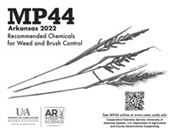Division Of Agriculture Releases 2022 Versions Of Weed, Pest And Disease Management Guides

The most widely used publications from the University of Arkansas System Division of Agriculture have been updated for 2022 with the
latest research-based recommendations for managing pests, weeds and diseases in row crop agriculture, as well as fruit, vegetable and garden production.
Division of Agriculture image
TRACY COURAGE
LITTLE ROCK, ARKANSAS
The most widely used publications from the University of Arkansas System Division of Agriculture have been updated for 2022 with the latest research-based recommendations for managing pests, weeds and diseases in row crop agriculture, as well as fruit, vegetable and garden production.
The 2022 publications include:
• MP44 – Recommended Chemicals for Weed and Brush Control: https://www.uaex.uada.edu/publications/mp-44.aspx
• MP144 – Insecticide Recommendations for Arkansas: https://www.uaex.uada.edu/publications/mp-144.aspx
• MP154 – Arkansas Plant Disease Control Products Guide: https://www.uaex.uada.edu/publications/mp-154.aspx
Printed copies of the guides are available at county extension offices at no charge. Digital copies of the three guides, along with other extension publications, are available online at https://www.uaex.uada.edu/publications/new.aspx
. “MP” stands for “miscellaneous publication.” The guides are updated annually to reflect the most current research-based information.
“The MP publications dealing with pesticides are universal to all walks of life. These publications are used not only by all agriculture producers but also by homeowners and businesses of all types,” said Victor L. Ford, associate vice president for Agriculture and Natural Resources with the Cooperative Extension Service, part of the Division of Agriculture.
“Do not think that these are only non-organic solutions because there are also organic recommendations,” Ford said. “All recommendations are based on the best scientific research at time of publication and vetted by nationally known experts in the field. You can trust these recommendations to be effective, economical and legal.”
Ford said that chemicals, rates and application rates recommended in the publications will not conflict with registered labels issued by the U.S. Department of Agriculture and U.S. Environmental Protection Agency.
MP44, “Recommended Chemicals for Weed and Brush Control,” is a one- stop shop for information about herbicides, applications and the most up-to-date weed control recommendations for Arkansas.
“The 2022 edition has once again been updated with the newest emerging herbicides and university recommendations for weed control based on first-hand research,” said Tommy Butts, assistant professor and extension weed scientist for the Division of Agriculture. “In addition to the latest information presented in the book, several QR codes have been added throughout the MP44 to direct users to more online resources and information about weed management. This is a must- have resource for anyone using herbicides for weed control in Arkansas.”
MP144, “Insecticide Recommendations for Arkansas,” contains information on recommended insecticides in row crops, animal agriculture, fruits, nuts, vegetables and household pests.
“The most significant change this year is the removal of chlorpyrifos (Lorsban) from all food crops,” said Glenn Studebaker, extension entomologist for the Division of Agriculture. “The EPA has revoked all tolerances for this active ingredient on all food crops.”
The mobile-friendly edition of MP 144 is available at https://mp144.uada.edu/ .
The “Arkansas Plant Disease Control Products Guide” – or MP 154 – includes a list of fungicides and nematicides registered for use in Arkansas that are used to control diseases of row crops, vegetables, small fruits, turfgrass and ornamental plants.
“The 2022 edition of MP154 has a few new fungicides among various crops and updated fungicide efficacy tables for corn, soybean, and wheat,” Division of Agriculture extension plant pathologist Travis Faske said.
All of the information in the guide is generated by extension plant pathologists who conduct applied research trials across the state. ∆
TRACY COURAGE: University of Arkansas